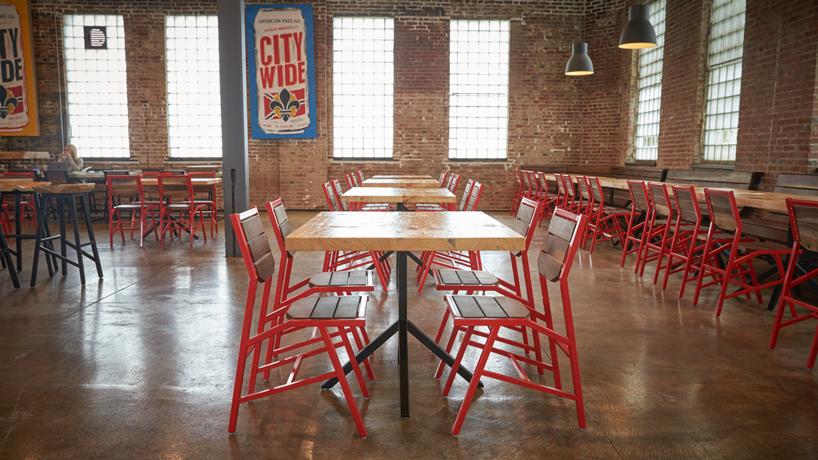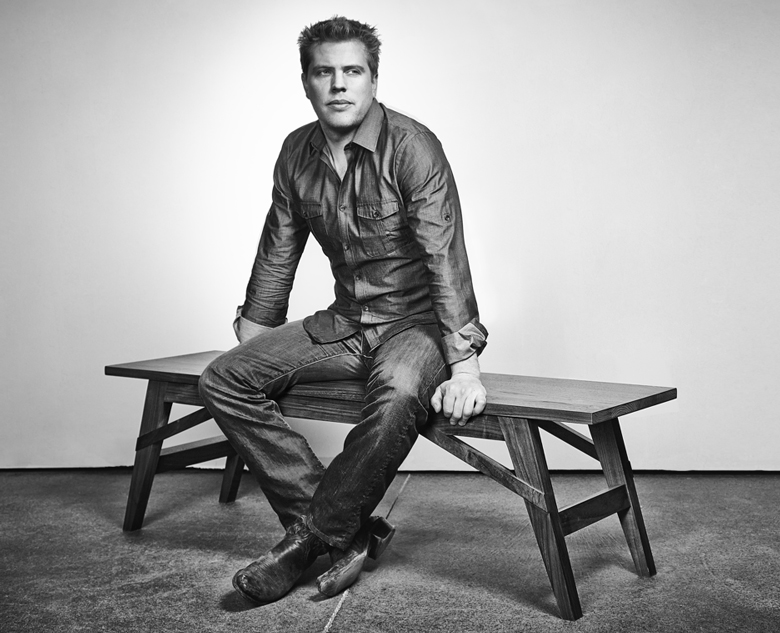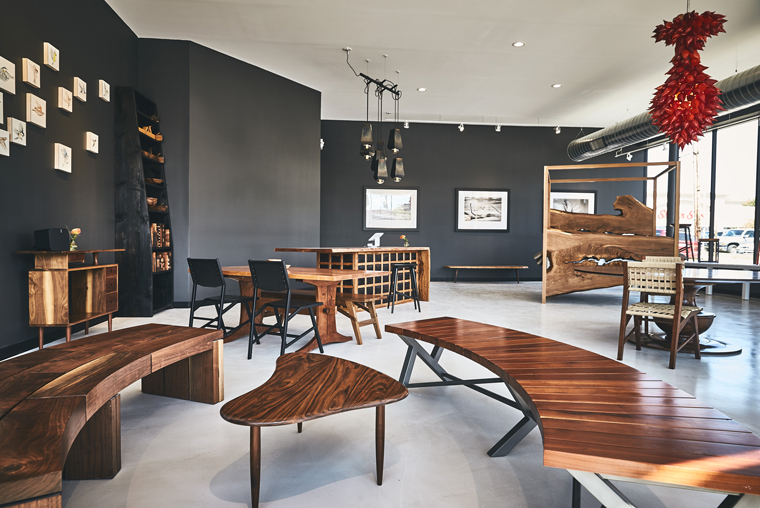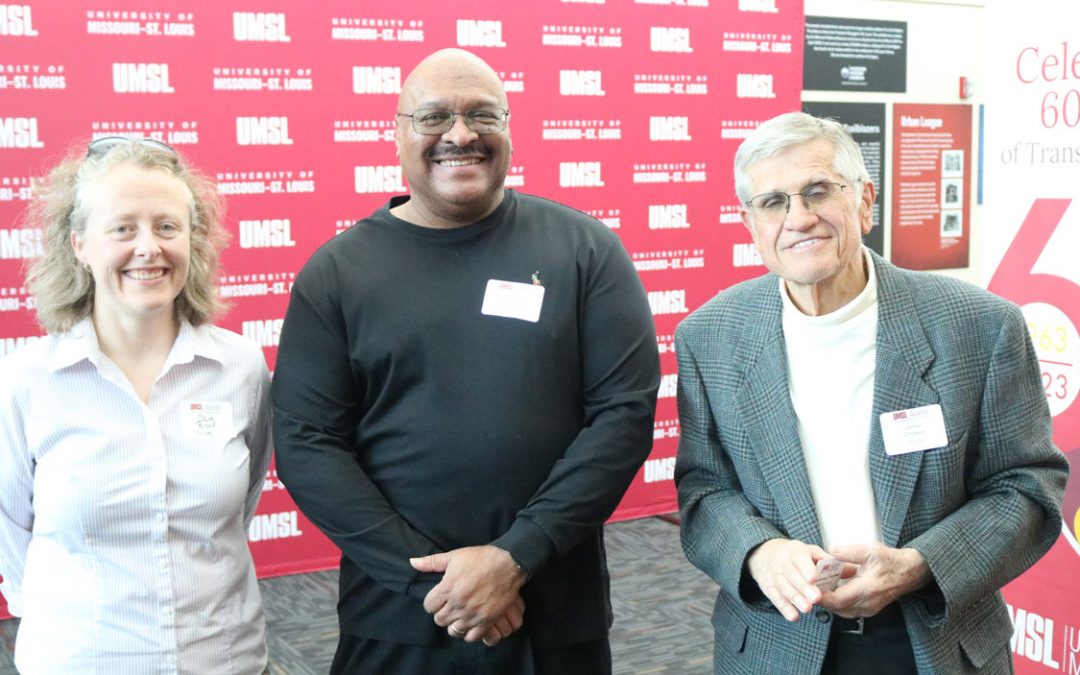
Among the 40 production pieces currently designed and made to order by Martin Goebel’s locally based furniture company are the red chairs that fill 4 Hands Brewing Company’s tasting room in downtown St. Louis. (Photos courtesy of Martin Goebel)
When Martin Goebel launched a new storefront in the St. Louis region a couple months ago, Jeff Sippel was one of the first people he shared the news with – even though it had been almost a decade since the two had seen each other.
They’d met in January 2007 when Goebel was a prospective University of Missouri–St. Louis art student looking to finish his undergraduate degree – and fast.
“I had one calendar year to get everything in line so that I could get on to grad school, which was my entire goal,” explains the St. Louis native, who was studying journalism at University of Missouri–Columbia at the time and had also earned credits at institutions ranging from a woodworking school in California to St. Louis Community College. “I visited UMSL, met with Jeff and said, ‘Hey, this is where I’m at, and this is where I need to be.’”

The accommodating way in which an art professor at UMSL responded to Martin Goebel’s questions more than a decade ago, when he was a prospective transfer student, made a big difference for the now 35-year-old design director.
Sippel helped the then-emerging furniture designer chart out an ambitious but achievable path to a BFA – one that would next lead him to the Rhode Island School of Design for an MFA before his return to St. Louis, where he is now president and design director for Goebel & Co. Furniture.
Looking back, Goebel says those initial conversations with Sippel made a big difference. He’d visited several other schools to learn about his options and kept coming away feeling “like just a number, a dollar sign.” Talking to Sippel about his personal goals and interest in an accelerated academic timeline was a refreshing contrast.
The UMSL Department of Art and Design faculty member didn’t mince words; he made it clear that Goebel would need to successfully complete a whopping 39 credits over the course of just two semesters and a summer. But he was clearly eager to help make it happen if Goebel was truly committed to the idea – and he was.
“I know that Jeff had to get a number of approvals from some of the other faculty and staff,” Goebel, now 35, recalls. “But, I mean, he literally said, ‘Let’s help this guy get to where he’s going.’ Jeff would’ve walked through fire for me.”
When Goebel gave him a call earlier this fall to tell him about his company’s new showroom located at 7401 Manchester Road, Sippel was delighted. He quickly headed over for a tour of his former student’s retail space.
“He’s a printmaker, and I’m in the furniture/product world,” Goebel says, “but there’s sort of an intuitive ‘I understand all the stuff you went through.’”
As established as Goebel and his present team of designers, craftsmen and partners appear to be, with Goebel & Co. Furniture now in existence for nearly seven years, success hasn’t come easy. The way Goebel puts it, the field he’s chosen can be a fickle one.

Goebel & Co. Furniture opened a showroom at 7401 Manchester Road in Maplewood, Missouri, earlier this fall. The company’s production headquarters are located in the Midtown area of St. Louis.
“It’s working as long as people keep buying stuff,” he notes. “But just like any company, if people stop buying stuff, it can die pretty quickly.”
Goebel, who grew up in Richmond Heights, Missouri, has been building furniture ever since he dropped out of a foreign-language elective in high school and opted for a shop-class offering instead. He’s been in the business long enough to see broad economic conditions greatly impact the market for hand-built furniture.
It was after building and selling custom pieces on his own for four years as a young adult that the recession of the early 2000s hit, prompting him to seek a new career and enroll at Mizzou – while still crafting furniture on the side.
“I would spend four days a week in Columbia and then three days a week back here in St. Louis building furniture,” Goebel explains.
One day, three semesters into a journalism degree, he crossed paths with a professor outside of class, and they got to talking about Goebel’s situation.
“He just said to me, ‘So why are you driving back and forth?’” Goebel remembers. “And he said, ‘There’s no reason you can’t do the furniture and no reason you can’t do the journalism, but you can’t do both.’ So at that point, I kind of took his advice and decided I really wanted to be in the furniture world.”
And despite its propensity for booms and busts and the lack of guarantees, that world continues to be a source of personal satisfaction and joy as well as income for Goebel.

“A lot of the furniture that we create is based on very traditional furniture but updated with modern aesthetics, different production methods, things like that,” says UMSL alumnus Martin Goebel. Pictured is his company’s Luna Rocker.
“The really great part is seeing how we affect the lives of people,” he says. “It’s this creative endeavor for us. But every morning you wake up and see this table, and you remember who actually made that thing – it’s definitely a privilege to be invited into someone’s life that way.
“And it’s for an extended period. The mass-production furniture industry is kind of like washers and dryers where it has a planned obsolescence in about seven years. The joinery, the finishes, the adhesives – it’s engineered to do that and made to fail, and every five or 10 years you have to buy it again. Since World War II, that’s been part of at least the American furniture industry.”
The furniture created by Goebel & Co., at the company’s production headquarters in St. Louis’ Midtown commercial district, is of a different sort. Goebel compares the contrasting processes and trends to those surrounding the baking of bread.
“We inject a whole lot of technology into a very, very traditional process that still involves just the few key ingredients but is more efficient,” he says. “If you look at a bag of Wonder Bread, there’s something like 37 ingredients listed. But people made bread out of water, flour, yeast and a little bit of salt for thousands of years. And only in maybe the last 50 have they been making bread the Wonder Bread way, and it’s not helping society.”
Goebel and his team aim for traditional furniture with modern aesthetics and a variety of production methods – all of it built to last.
When a toddler beats on a mass-produced table with his fork, Goebel offers by way of example, the parents who bought the table will not only be momentarily annoyed but “those fingerprints of life will eventually destroy that table.” His pieces, on the other hand, will also show some wear and tear from such “timestamps,” he says, but in ways that often heighten their nostalgic meaning as heirlooms.
“The personal significance of it is what makes it yours,” Goebel adds. “Are there 50 like it in the world? Probably. But that one’s now yours, and more importantly, when that kid is 35 or 60, that thing is still going to be around, and then that’s his connection to you and that time in his life.”















